Bangor Historical Society held its last meeting of 2022 on 8 December to hear a talk by Alan Cook. His subject was the Cook family at war. His research had been encouraged by a visit to the Antiques Roadshow which was held in Hillsborough. He had already done some research on the family which he took to the Roadshow. This included panels with family history. The experts were so intrigued by what they called the best presentation for some time that he met Fiona Bruce and Paul Atterbury. He was then filmed telling the family story.

The Cook family had originally come from England. In 1919 his grandmother Gladys married Thomas Cook, a Captain in the merchant navy who had served in World War One. They had 3 children: 2 boys and a girl. The family moved to Malaya where his grandfather joined the East India Company. He ran a gunboat which searched for opium smugglers.
By the 1930s the family had returned to England. Life was tough and his grandfather got a job as an Electrolux salesman, selling fridges.
Members of the family became involved in the Second World War in various roles. Alan’s 17-year-old father was in the merchant navy while his aunt Pam joined the Wrens. His grandfather was in the Royal Naval Reserve. He became the Captain of a paddle steamer which was converted into a minesweeper. It was called the Medway Queen and it patrolled the mouth of the Thames. Later it took part in the evacuations from Dunkirk in 1940. Paddle steamers had been sent out first because of their shallow draught and because they could take at least 700 people.
In the next 7 days the boat made 7 trips, although it was only supposed to do one. It brought back to England at least 7,000 people. The last trip was on 4th June and it was one of the last ships to leave. One of the problems for the evacuation was that people were afraid that Germans would put people on board the ships disguised as Frenchmen so that they could sabotage the ships.
The Medway Queen also shot down 3 planes. The Captain wrote to the Vice Admiral recommending awards for the crew. He himself received a distinguished service award. The speaker later became involved with a special TV programme about the Medway Queen and there is now a preservation society which is restoring it. In the programme he met the sole survivor of the Medway Queen evacuation – a former soldier. Mr Cook has also contributed an introduction to a book about the ship.
Meanwhile his grandmother waited anxiously for news about her husband and family. A dog kept her company and she put a candle in the window when one of her family came home.
Alan Cook’s father also did war service. He was a third lieutenant on the SS Brittany which brought beef and other supplies from south America. On 29 October 1940 he saw 2 German torpedoes coming for the ship. The serious damage included the lifeboats. As the ship sank, the cotton bales it was carrying ended up in the sea. One bale helped Lt. Cook get to the surface. He helped others and 12 hours later they were rescued. He received the MBE and the Lloyd’s Medal for bravery at sea, an award for merchant seamen. The ship was part of a convoy sailing off North Africa and may have been used to divert attention from ships carrying troops going to North Africa to fight there.
Later Alan Cook’s father joined the Royal Naval Reserve and was posted to a frigate based in Belfast. He met a girl there whom he later married.
Alan Cook was called after his uncle who was in the RAF, serving as a navigator in Wellington bombers. In August 1942 his plane crash landed in Germany. He became a prisoner of war in Stalag VIIIB. His mother was able to send parcels to him in this camp in western Poland. Months later he was shot dead while trying to escape. It was only after the iron curtain was lifted that his nephew was able to go to Poland to find the grave.
